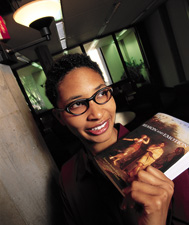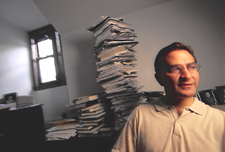When
the Magazine
asked a group of Chicago faculty how they planned to spend their
summer, the answers had one constant: enthusiasm.
 Danielle
Allen, Classics
Danielle
Allen, Classics
Danielle Allen's summer schedule is full. An assistant professor
in classical languages & literatures and in the College, she's
back from delivering a paper in Berlin and about to start a four-week
stint teaching "Intro to Attic Greek 2", three hours a day, five
days a week. She's also juggling work on the final two chapters
of a book about rhetoric and democratic deliberation with the
editing of a video documentary on Iranian women poets and novelists.
But the feel is different, she says, because she's just finishing
up a year as a fellow at the Franke Institute for the Humanities.
 |
| Danielle
Allen, Classics |
"One
of the great advantages of having the year at the Franke Institute,"
she says, "is that this year summer feels like a capping-off time."
With six chapters of Intricate Democracy: Hobbes, Ellison,
and Aristotle on Distrust, Rhetoric, and Civic Friendship firmly
drafted, the first draft of another chapter completed, and one
to go, she's "at that stage where the adrenaline kicks in, with
more ideas all the time."
The book argues that the durability of democracy depends not only
on legislation and policy-making but also on the cultivation of
civic friendship, examining how the art of rhetoric can be used
to those ends. Political rhetoric also figured in Allen's paper
for a June conference on "The Moral Authority of Nature," held
at the Max Planck Institute for the History of Science. Looking
at bees and beehives and their persistence as a symbol for the
model political community, she focused on Bernard Mandeville's
Fable of the Bees: or Private Vices, Publick Benefits,
asking, "Why is the bee such a fixed trope in the landscape? What
use is it?" Published in 1714, Mandeville's fable, she explains,
had to work "to assimilate the new natural information-that a
hive was ruled by a queen, not a king, for example-with existing
assumptions about gender and governance."
In
addition to writing and to teaching Greek in fast motion ("It's
an extraordinary feat of memorization," she says, "for kids who
really like a challenge"), Allen is working with a group of graduate
students from several disciplines to edit a short video documentary.
Using footage from a friend's larger documentary project, Allen
and the students have focused on four women poets and novelist
who write about love and memory as they relate to Iranian self
understanding and social memory. "One of the those women," she
says, "has just been put in prison, so it's plain that their writings
are having a political impact."
Before
the documentary makes its debut at the Humanities Open House this
fall, Allen says, "We need to finalize the version and record
it-the script's multivoiced and we'll do the voices ourselves."
She smiles. "It's very much a learning process for us.
Steven
Kaplan, GSB
A towering Babel of e-business plans looms on Steven Kaplan's
credenza. The other focal points in his decidedly utilitarian
Rosenwald 425 office are silver-framed black-and-white photographs
of his two young sons and a collection of coffee cups, tumblers,
and mugs in various states of use.
Kaplan, the Neubauer Family professor in entrepreneurship
and finance at the GSB, explains that many of the piled-high proposals
are from former students trying to get Internet ventures off the
ground. Fueled by seemingly constant supplies of caffeine, he
is spending a part of his summer working his way through the proposals-a
process, he says, that "brings together my research, teaching,
and outside interests."
 |
| Steve
Kaplan, GSB |
Although he has the summer off from teaching, he's
pulling together the course outline for his fall quarter course,
Entrepreneurial Finance and Private Equity, which he'll offer
in both the full-time and evening MBA program. He's also writing
three papers, two with colleagues at Chicago and one with an economist
from MIT. All are on questions that he calls "interesting to academics
and to the real world too."
Take for example, a paper for an upcoming conference
sponsored by the National Board of Economic Research. Written
with Luis Garicano, AM'95, PhD'98, an assistant professor in economics
and strategy, the paper is "the first academic attempt to measure
the costs and benefits of using the Internet for business-to-business
transactions." The data for the study, he says, comes from companies
that former students have started: "Everything's related," he
grins.
With Per Stromberg, another GSB colleague, Kaplan
is at work on a paper that asks, What do venture capitalists do?
"In finance and economics, there's a lot of theory about how an
investor decides to invest in a company or a product," he explains,
"but very little hard data about the environment in which those
decisions are made." Kaplan and Stromberg went to a dozen or so
venture capitalists and asked for that data: the business plans
from the corporations seeking investments, the investors' analysis
of the plans, and the contracts outlining the terms of investment.
Now that data-some neatly filed in sturdy brown boxes, some stacked
in loose piles awaiting review-fills several shelves in Kaplan's
office. Their analysis of how investors analyze and make investments
should be of interest to economists and start-ups alike.
For the Journal of Economic Perspectives,
Kaplan and MIT economist Bengt Holmstrom are completing a survey
of corporate governance and mergers in the 1990s. Kaplan stops
to check a deadline on his computer screen, grimaces slightly,
continues outlining the paper: "The LBOs and hostile takeovers
of the '80s went way down in the 1990s. We're looking at why the
mechanisms for merger changed."
Then back to the ever-growing tower. The good news,
for Kaplan as well as the companies who send him their plans:
"I can tell pretty quickly," he allows, "which ones are going
to work."



![]()
 Danielle
Allen, Classics
Danielle
Allen, Classics 
